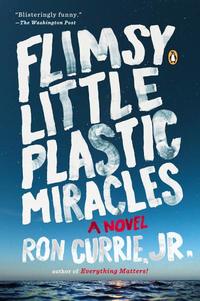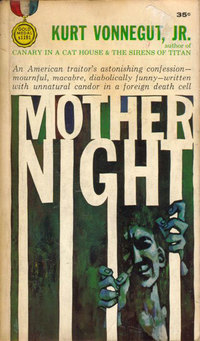
This week the Library of America edition of Kurt Vonnegut’s fiction culminates in the release of Kurt Vonnegut: Novels 1987–1997, which brings together three novels from his late period: Bluebeard (1987), Hocus Pocus (1990), and Timequake (1997).
In honor of the occasion, we asked contemporary writer Ron Currie, Jr. to share what Vonnegut’s writing has meant to him. Currie is the author of three works of fiction, the most recent of which, Flimsy Little Plastic Miracles (2013), was hailed by his fellow novelist Kate Christensen as “Both a brilliantly constructed inquiry into the nature of reality and a soulful ode to the free fall of obsessive love.”
A couple of years ago I was sitting in the backyard of Kurt Vonnegut’s house on Cape Cod, having been invited by his daughter to spend a week there writing, or whatever else I chose to do. This was a late-summer day, breezy and briny, some sun, some clouds. Pretty, to be sure, and pleasant enough, but also sort of unremarkable. Overhead, two crows circled and cawed at one another. They were not handsome birds and, being crows, they were not making pretty sounds. I looked up and watched them wheel over the marsh like fighter jets, and something popped into my head unbidden: Isn’t it amazing, I thought, that birds can actually fly.
I’d seen a lot of birds fly. I shouldn’t have been floored by it at this point. And yet there I was, seized by this glorious if brief moment of wonder, freed from the cynicism accumulated over nearly forty years of living in the often ugly and always absurd world that Kurt skewered so skillfully, and so affectionately: Holy crap, these birds were flying. Actually up there in the sky, no wires, no strings, floating on the invisible and impalpable stuff we call air. Wasn’t that amazing? And also totally ridiculous? Weren’t they unspeakably beautiful, and didn’t they make the most awful sounds? What the hell was going on, here or anywhere else? Nothing made any sense; everything made perfect sense.
It was, I came to realize, a vintage Vonnegut moment, not unlike the time I first laid hands on his work, back in my late teens, and thought, “Christ on a pogo stick, what is this?”

I’m talking about Cat’s Cradle, wherein I made the acquaintance of such iconic Vonnegut inventions as Ice-9 and Bokononism. I was rapt. I immediately devoured the rest of Kurt’s bibliography, and continued to delight in the zaniness, the gleeful improbabilities, the cockeyed morals. These were the howling enthusiasms of a younger man, it’s true. Now that I’m older, I most appreciate Mother Night, Kurt’s most earthbound, sober, and heartbreaking work.
Which brings me to this: people who knock Vonnegut often claim that his writing is adored by young adults, but that those same fans eventually grow out of him. The implication is that his work, if truly admired only by kids, is not to be taken seriously. But this misses the point. The point is that in his writing Kurt maintained, with great effort, the idealism most of us slough off. We call this self-degradation wisdom, or experience. And as is so often the case when we perceive a shortcoming in someone else, further reflection reveals that the deficiency is our own. Vonnegut’s writing is not comic book philosophy that appeals only to the inexperienced or naïve; rather, the process we refer to as “growing up” renders us too smugly stupid to appreciate its modest, winking profundity. We forget how to marvel at the crows.
The first generation to embrace Kurt had a saying: “Don’t trust anyone over 30.” That’s an ultimately silly admonishment, of course, as all those Boomers now limping across the finish line into retirement can tell you. But maybe an amended version will do nicely here: “Don’t trust anyone over 30 with your lodestar.” We dismiss at our peril the youthful romanticism that made us respond when we first heard Vonnegut’s call to love the world. Fortunately, his words are still there to remind us of it, if we only choose to listen.
P.S. Influence? How about this: It has come to pass that 78% of reviews have compared my books to Vonnegut’s (this is, by the way, an approximation; I’m not great at math). Take that however you will.
On the other hand: Vonnegut famously loathed semicolons, and believed they had no function or reason for being. I, on the other hand, love semicolons; I use them quite a lot.
And there’s influence for you. So it goes.



